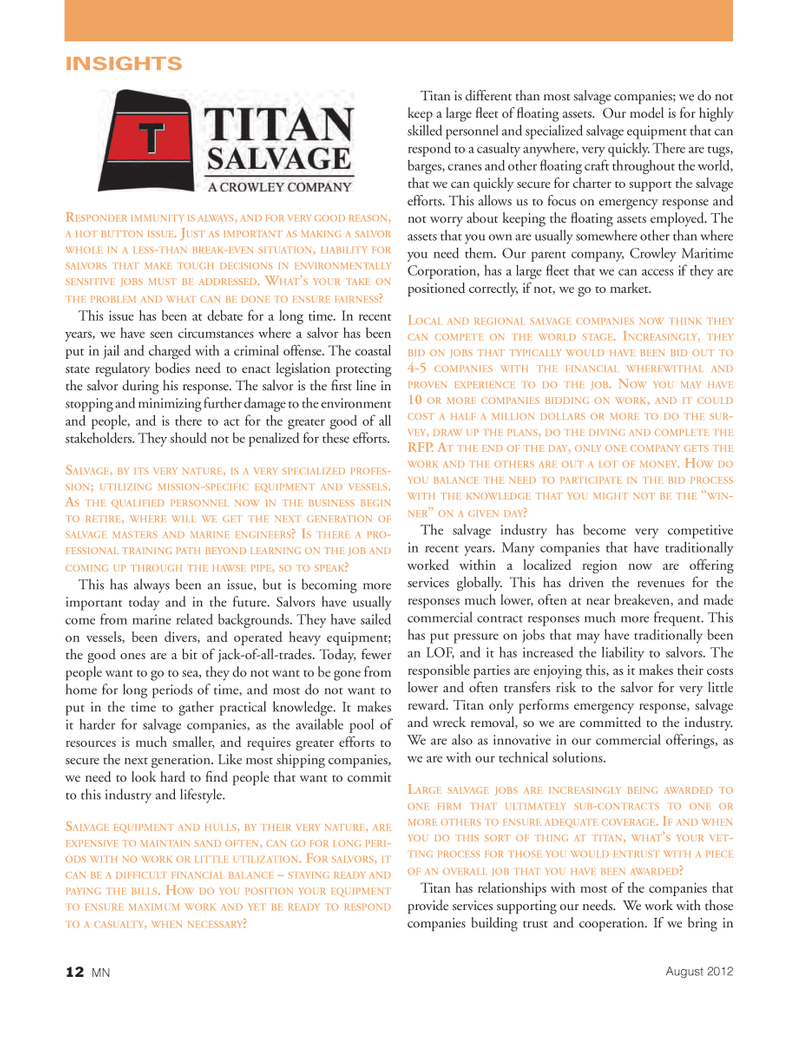
Page 12: of Marine News Magazine (August 2012)
Salvage & Recovery
Read this page in Pdf, Flash or Html5 edition of August 2012 Marine News Magazine
INSIGHTSRESPONDER IMMUNITY IS ALWAYS , AND FOR VERY GOOD REASON, A HOT BUTTON ISSUE. JUST AS IMPORTANT AS MAKING A SALVOR WHOLE IN A LESS-THAN BREAK-EVEN SITUATION , LIABILITY FOR SALVORS THAT MAKE TOUGH DECISIONS IN ENVIRONMENTALLY SENSITIVE JOBS MUST BE ADDRESSED. WHAT ?S YOUR TAKE ON THE PROBLEM AND WHAT CAN BE DONE TO ENSURE FAIRNESS ?This issue has been at debate for a long time. In recent years, we have seen circumstances where a salvor has been put in jail and charged with a criminal offense. The coastal state regulatory bodies need to enact legislation protecting the salvor during his response. The salvor is the Þ rst line in stopping and minimizing further damage to the environment and people, and is there to act for the greater good of all stakeholders. They should not be penalized for these efforts. SALVAGE , BY ITS VERY NATURE , IS A VERY SPECIALIZED PROFES -SION; UTILIZING MISSION-SPECIFIC EQUIPMENT AND VESSELS. AS THE QUALIFIED PERSONNEL NOW IN THE BUSINESS BEGIN TO RETIRE, WHERE WILL WE GET THE NEXT GENERATION OF SALVAGE MASTERS AND MARINE ENGINEERS? IS THERE A PRO -FESSIONAL TRAINING PATH BEYOND LEARNING ON THE JOB AND COMING UP THROUGH THE HAWSE PIPE , SO TO SPEAK ?This has always been an issue, but is becoming more important today and in the future. Salvors have usually come from marine related backgrounds. They have sailed on vessels, been divers, and operated heavy equipment; the good ones are a bit of jack-of-all-trades. Today, fewer people want to go to sea, they do not want to be gone from home for long periods of time, and most do not want to put in the time to gather practical knowledge. It makes it harder for salvage companies, as the available pool of resources is much smaller, and requires greater efforts to secure the next generation. Like most shipping companies, we need to look hard to Þ nd people that want to commit to this industry and lifestyle. SALVAGE EQUIPMENT AND HULLS, BY THEIR VERY NATURE , ARE EXPENSIVE TO MAINTAIN SAND OFTEN, CAN GO FOR LONG PERI -ODS WITH NO WORK OR LITTLE UTILIZATION . FOR SALVORS , IT CAN BE A DIFFICULT FINANCIAL BALANCE ? STAYING READY AND PAYING THE BILLS. HOW DO YOU POSITION YOUR EQUIPMENT TO ENSURE MAXIMUM WORK AND YET BE READY TO RESPOND TO A CASUALTY , WHEN NECESSARY ? Titan is different than most salvage companies; we do not keep a large ß eet of ß oating assets. Our model is for highly skilled personnel and specialized salvage equipment that can respond to a casualty anywhere, very quickly. There are tugs, barges, cranes and other ß oating craft throughout the world, that we can quickly secure for charter to support the salvage efforts. This allows us to focus on emergency response and not worry about keeping the ß oating assets employed. The assets that you own are usually somewhere other than where you need them. Our parent company, Crowley Maritime Corporation, has a large ß eet that we can access if they are positioned correctly, if not, we go to market. LOCAL AND REGIONAL SALVAGE COMPANIES NOW THINK THEY CAN COMPETE ON THE WORLD STAGE . INCREASINGLY , THEY BID ON JOBS THAT TYPICALLY WOULD HAVE BEEN BID OUT TO 4-5 COMPANIES WITH THE FINANCIAL WHEREWITHAL AND PROVEN EXPERIENCE TO DO THE JOB. NOW YOU MAY HAVE 10 OR MORE COMPANIES BIDDING ON WORK , AND IT COULD COST A HALF A MILLION DOLLARS OR MORE TO DO THE SUR-VEY , DRAW UP THE PLANS , DO THE DIVING AND COMPLETE THE RFP. A T THE END OF THE DAY , ONLY ONE COMPANY GETS THE WORK AND THE OTHERS ARE OUT A LOT OF MONEY . HOW DO YOU BALANCE THE NEED TO PARTICIPATE IN THE BID PROCESS WITH THE KNOWLEDGE THAT YOU MIGHT NOT BE THE ?WIN-NER? ON A GIVEN DAY ?The salvage industry has become very competitive in recent years. Many companies that have traditionally worked within a localized region now are offering services globally. This has driven the revenues for the responses much lower, often at near breakeven, and made commercial contract responses much more frequent. This has put pressure on jobs that may have traditionally been an LOF, and it has increased the liability to salvors. The responsible parties are enjoying this, as it makes their costs lower and often transfers risk to the salvor for very little reward. Titan only performs emergency response, salvage and wreck removal, so we are committed to the industry. We are also as innovative in our commercial offerings, as we are with our technical solutions. LARGE SALVAGE JOBS ARE INCREASINGLY BEING AWARDED TO ONE FIRM THAT ULTIMATELY SUB-CONTRACTS TO ONE OR MORE OTHERS TO ENSURE ADEQUATE COVERAGE . IF AND WHEN YOU DO THIS SORT OF THING AT TITAN , WHAT ?S YOUR VET-TING PROCESS FOR THOSE YOU WOULD ENTRUST WITH A PIECE OF AN OVERALL JOB THAT YOU HAVE BEEN AWARDED ?Titan has relationships with most of the companies that provide services supporting our needs. We work with those companies building trust and cooperation. If we bring in 12 MNAugust 2012

 11
11

 13
13
